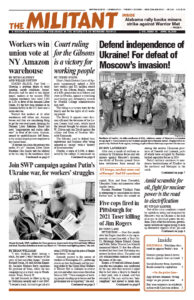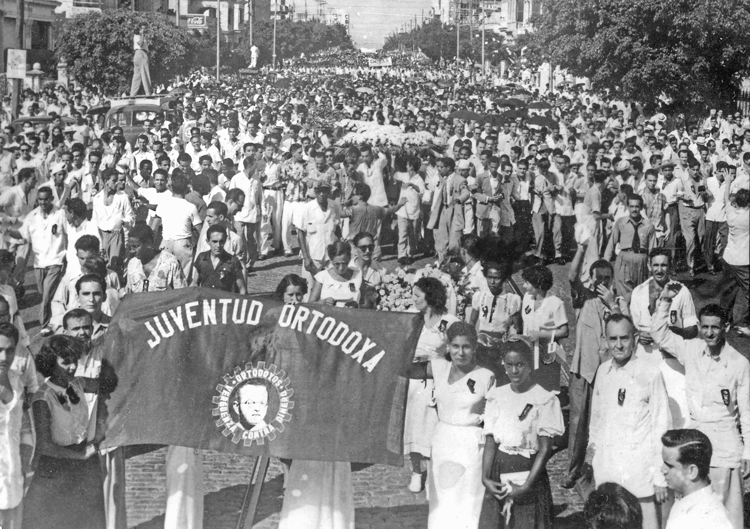One of Pathfinder’s Books of the Month for April is the Spanish edition of Aldabonazo: Inside the Cuban Revolutionary Underground, 1952-58, a Participant’s Account by Armando Hart. One of the historic leaders of the Cuban Revolution, Hart was a central organizer of the urban underground. In 1959 Cuba’s toilers, led by Fidel Castro and the July 26 Movement, carried out what became the first socialist revolution in the Americas. As minister of education, Hart headed the mass literacy campaign in 1961 in which a million Cubans learned to read and write. He was minister of culture from 1976 to 1997 and remained politically active in defense of the revolution until his death in 2017. The excerpt is from “Revolution: The Only Way Out,” the May 15, 1956, editorial in the first edition of Aldabonazo, the clandestine newspaper of the July 26 Movement. Copyright © 2004 by Pathfinder Press. Reprinted by permission.
By an imperative, collective necessity, a new generation has arisen to confront the revolutionary frustration that led us to the disaster of March 10, 1952. On that date a gang of common criminals seized power and destroyed the public order of the republic. The July 26 Movement, which spoke the language of facts, is a categorical response to the March coup. The Movement’s origin and aims, which we will present in these pages, reveal to us how Cuban youth have become unwilling to put up with the status quo that made possible the resounding collapse of our hollow political democracy. For this reason our aim is to become the revolutionary instrument of this new generation.
For the July 26 Movement, only those who aim at something more than simply toppling the dictatorship are capable of really eliminating it. That is the only way to draw together the moral forces of the nation. Those who simply strive to “topple the dictator” will not even achieve that, since they lack both serious motives and support from the social forces necessary to stand up to a regime embodying the most negative aspects of Cuban society. The July 26 Movement asserts that the current government is not the cause but the result of the republic’s fundamental crisis. And it is working directly to resolve that crisis. It would hardly be worthwhile to confront the dictatorial, corrupt, and mediocre regime we suffer without aiming for a revolutionary transformation of the moral, political, economic, and social causes that made possible the criminal act committed by the seditious group. That is the reason for our revolutionary independence, and the reason for being of our growing force. …
The country has been and is being governed by criminals of the worst stripe. Thieves, smugglers, speculators, price gougers, and even vulgar assassins are more and more in control of key posts in government, beginning with what should be the government’s highest court.
In this aspect of the Cuban question, the figure of Eduardo Chibás, with his slogan “Honor against money,” comes to the fore. Chibás gathered around himself a powerful body of opinion and a great political movement that united together the ideals of the Cuban Revolution. It is to put those ideas into effect and for the definitive triumph of these ideas that the July 26 Movement fights. With his fatal pistol shot of August 5, 1951, Chibás showed the way of sacrifice and glory, and entered into history. In tribute to that gesture of supreme indignation and combat, our clandestine newspaper bears the name of his last speech: Aldabonazo.
But the deepest cause of our crisis lies in the absence of a clearly defined revolutionary philosophy, and the lack of an organized will that drives us toward realizable goals of improvement, transformation, and progress. It has not been possible to have ideas completely govern individual conduct. The ideas of the Cuban nation, in modern times, are still maintained as a great collective hunger. They are a desire that is scattered. … When the democratic and socialist idea is spelled out to its final consequence, all action will be directed along this road. At that point a group of men will emerge whose strength lies in their unbreakable unity, men who are united by the same principles and ideas. … That group will be “the team of men capable of leading Cuba toward its higher destiny” that Eduardo Chibás spoke of. The July 26 Movement aspires to find, discipline, and organize that team of men. And its organ of public guidance, Aldabonazo, has the mission of discovering revolutionary ideas and elaborating them. We are not heading to battle without ideas, because war without ideas is a crime, while war with ideas is revolution.
The heroic deed of the Moncada garrison and Bayamo is the unifying factor of our scattered national will. Eighty revolutionary martyrs offer us, through their example and sacrifice, a point of convergence that illuminates the country’s future. The most beautiful lesson of that gesture was not only the courage and selflessness displayed by those brave men. It was also their conviction of the importance, transcendence, and power of their example — not to mention their discretion and organizational capacity enabling them to reach the stage of combat. Only a total identification with revolution could write into history the rebel date of July 26, 1953. …
[T]he July 26 Revolutionary Movement for ten months has dedicated itself to publicly proclaiming the need for revolutionary action, and to constructing a powerful underground organization that gathers together and interprets the ideas of the Cuban nation, and the immediate needs of the people.
This strategy has delivered the revolution from small circles of combatants and placed it in the hands of the people. All Cubans have the possibility of participating: not only those who take up arms, but also those prepared to leave work, to contribute financially to buy the rifles, or to extend help to the revolution in a thousand different ways. Large sectors of the population have, for a number of years, felt cut off from the struggle for freedom. The July 26 Movement, with a popular strategy and with insurrectional tactics, is incorporating these sectors into the revolution.


